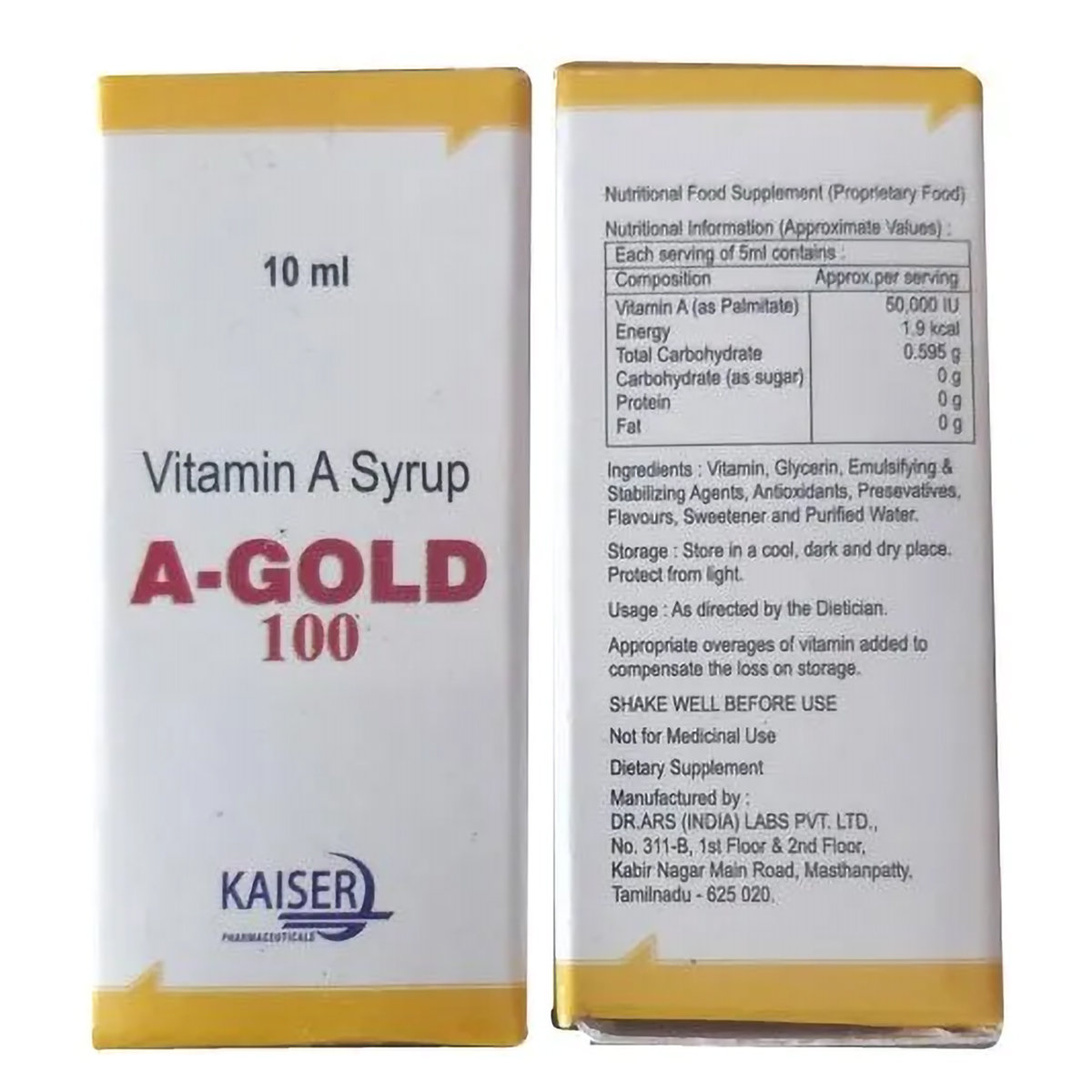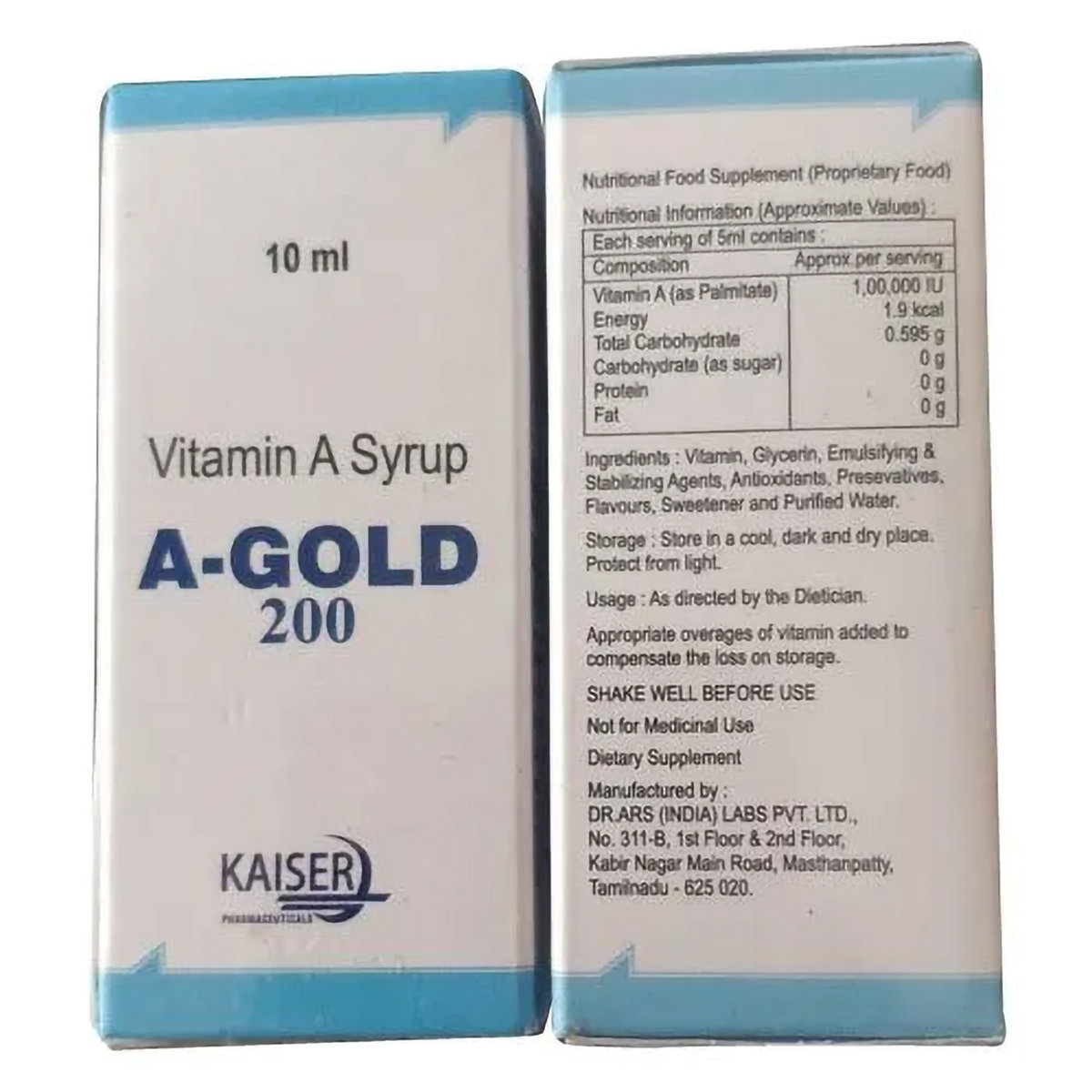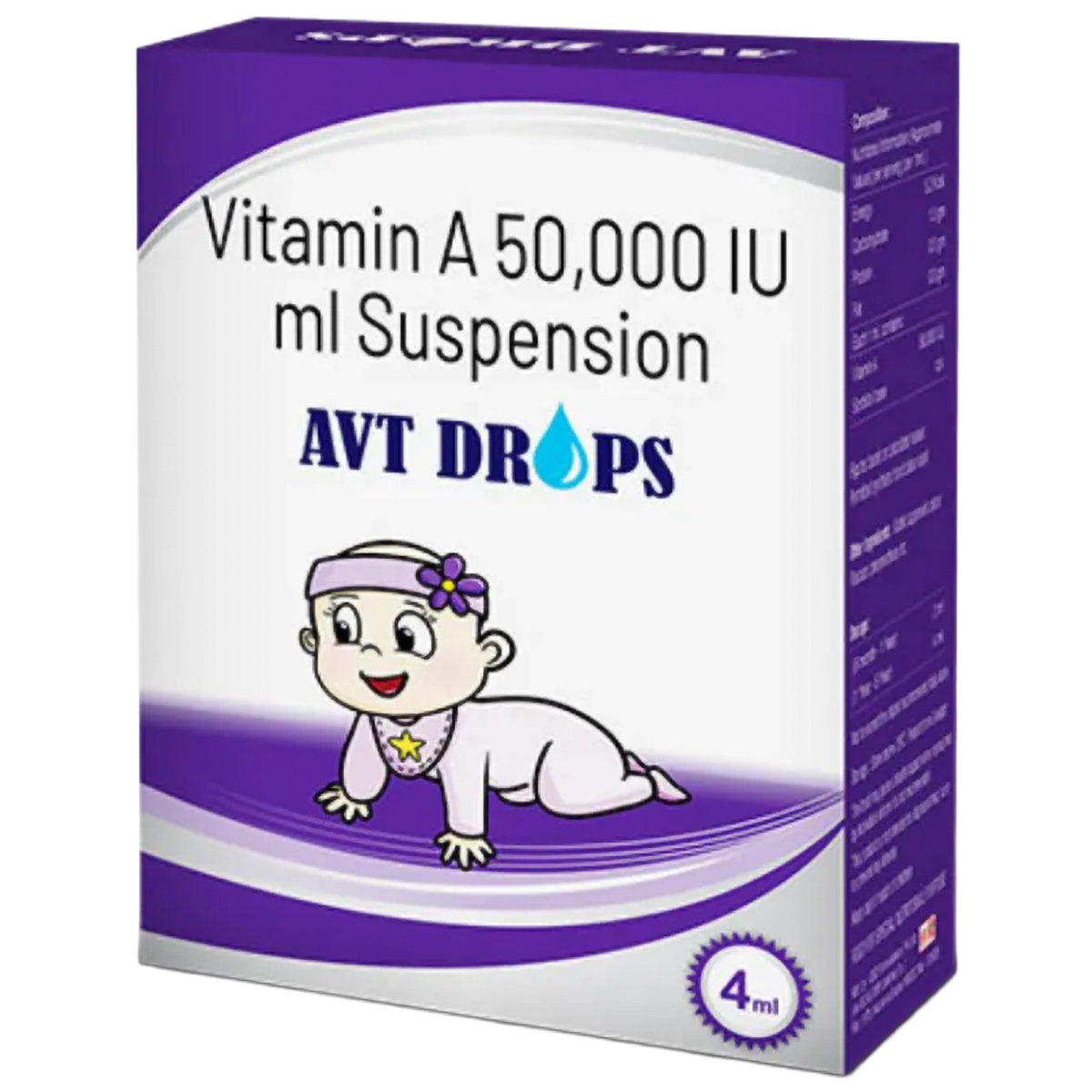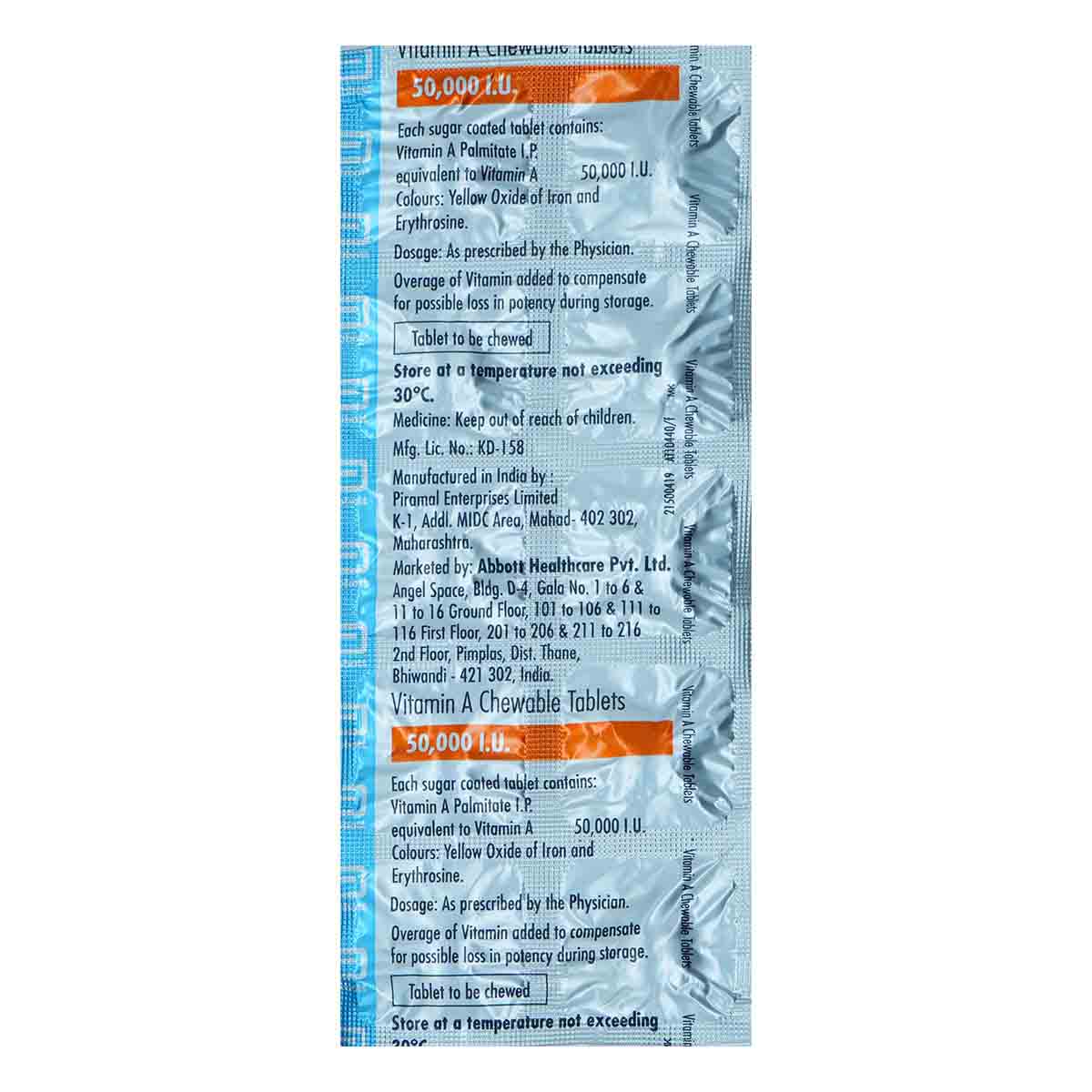Vitamin A
About Vitamin A
Vitamin A belongs to the class of medications called 'vitamins'. It is primarily used in the treatment of Vitamin A deficiency and nutritional deficiencies. It is also used in various skin products to reduce wrinkles and enlarged pores.
Vitamin A contains Retinol, which is present in various foods such as carrots, broccoli, cheese, eggs, milk, etc. Vitamin A is essential for the functioning of light-sensitive nerve cells (photoreceptors) in the eye's retina, which aids in maintaining night vision.
Vitamin A may rarely cause side effects like diarrhoea, headache, nausea, and vomiting in some cases. These side effects do not require medical attention and gradually resolve over time. Take Vitamin A as suggested by the doctor or the pharmacist.
Discontinue and inform your doctor if you observe any allergic reactions during the treatment. Also, inform your doctor if you have any skin reactions or irritation to any medicine before using Vitamin A. Keep your doctor informed about your health condition and all the medicines you take to rule out any side effects. Do not take Vitamin A if you are pregnant or breastfeeding unless the doctor advises.
Uses of Vitamin A
Medicinal Benefits
Vitamin A contains retinol, also known as Vitamin A, which is necessary for cell development, metabolism, vision, and immune functions. It also helps the body's natural defence against illness and infection. It is also useful in maintaining healthy skin and fighting infections. Thus, Vitamin A helps treat Vitamin A deficiency and nutritional deficiencies.
Directions for Use
- Take Vitamin A with or without food or as advised by a doctor.
- Follow your doctor’s instructions on the dosage and timing of this medication, to ensure the safety.
- Swallow the medicine as a whole with a glass of water.
- Do not crush, break, or chew it.
Storage
Side Effects of Vitamin A
- Diarrhea
- Headache
- Nausea
- Vomiting
- Dry mouth
Drug Warnings
Discontinue and inform your doctor if you observe any allergic reactions during the treatment. Keep your doctor informed about your health condition and all the medicines you take to rule out any side effects. Also, inform your doctor if you have any skin reaction or irritation to any medicine, malabsorption syndrome, liver/kidney disease or any other conditions before using Vitamin A. Vitamin A is safe for use in children, pregnant women, and breastfeeding mothers if taken in the suggested dose. It is advised not to take more than the recommended dose of vitamin A as it can cause major adverse effects.
Drug Interactions
Drug-Drug Interactions: No interactions found.
Drug-Food Interactions: Avoid or reduce intake of alcohol.
Drug-Disease Interactions: Inform your doctor if you have liver/kidney disease, skin disorders, and malabsorption syndrome.
Drug-Drug Interactions Checker List:
Safety Advice

Alcohol
cautionDrinking alcohol while taking Vitamin A is not suggested since it may induce unpleasant side effects.

Pregnancy
cautionVitamin A is generally safe for use in pregnant women if taken in the suggested dose. However, if you are pregnant or planning pregnancy, inform your doctor before taking Vitamin A. Your doctor may prescribe this medicine if the benefits outweigh the risks.

Breast Feeding
cautionIf you are breastfeeding, inform your doctor before taking Vitamin A. Your doctor may prescribe this medicine if the benefits outweigh the risks.

Driving
consult your doctorVitamin A usually does not affect your ability to drive. However, do not drive or operate machinery if you experience any side effects while using Vitamin A.

Liver
consult your doctorInform your doctor if you have or have had liver problems.

Kidney
consult your doctorInform your doctor if you have or have had kidney diseases.

Children
cautionVitamin A is generally safe for use in children. The dose of the medicine will be decided by your paediatrician.
Habit Forming
Diet & Lifestyle Advise
- Include dairy products like milk, yoghurt, cheese, or milk-based custard in your diet.
- Eat daily a serving of broccoli, cabbage, spinach, and other green leafy vegetables.
- Include the best sources of vitamin A, such as cheese, eggs, oily fish, fortified low-fat spreads, milk and yoghurt.
- You can also get vitamin A by including good sources of beta-carotene in your diet, as the body can convert this into retinol. The main food sources of beta-carotene are spinach, carrots, sweet potatoes, red peppers, mango, papaya and apricots.
Patients Concern
Disease/Condition Glossary
Nutritional deficiencies: A nutritional deficiency occurs when the body does not absorb or get enough nutrients from food. Many nutrients are essential for a healthy life. Sometimes, your body cannot absorb many nutrients, even if you consume them. Nutrient deficiency can lead to many health problems, like a weakened immune system, skin problems, heart problems, kidney diseases, respiratory illnesses, or neurological diseases.
Vitamin A deficiency: Vitamin A deficiency occurs due to a lack of vitamin A in the body or when your gut is unable to absorb nutrients as required. Vitamin A deficiency may cause tiredness (fatigue), eye and vision problems, and skin and hair problems.
FAQs
Vitamin A is used to manage and treat Vitamin A deficiency and Nutritional deficiency.
Vitamin A is essential for cell development, metabolism, immune competency, vision, and reproductive functions.
Vitamin A-rich foods include liver, beef, oily fish, chicken, eggs, fortified milk, carrots, mangoes, sweet potatoes, and leafy green vegetables.
If you miss a dose, take it as soon as you remember. However, if it is time for the next dose, skip the missed dose and take your usual dosage. Do not double the dose.
The recommended daily intake of Vitamin A varies by age and other factors. It's essential to consult with a healthcare professional to determine the optimal dose tailored to individual needs and health status. They will assess your specific requirements and provide personalized guidance.
Taking too much of Vitamin A may lead to an overdose. Overdose symptoms include severe headaches, dizziness, irritability, drowsiness, vomiting, nausea, blurred vision due to swelling of the nerves at the back of the eye, and itchy, red or peeling skin. If you experience these symptoms or suspect you have taken an overdose, seek immediate medical attention, even if there are no symptoms.
Yes, Vitamin A deficiency may cause blindness. Vitamin A plays a crucial role in maintaining healthy vision, and a lack of it can lead to night blindness, impaired vision, and even complete blindness if left untreated.
Swallow Vitamin A as a whole with a glass of water. Do not crush, break or chew it.
Vitamin A is generally considered safe when used as directed by a healthcare professional. To minimize potential risks, following suggested guidelines and reporting any unusual symptoms or side effects to your doctor is essential.
The common side effects of Vitamin A are diarrhoea, headache, nausea, dry mouth and vomiting. These side effects may not occur in everyone and may be mild. However, please consult your doctor if any of these side effects persist or worsen.










